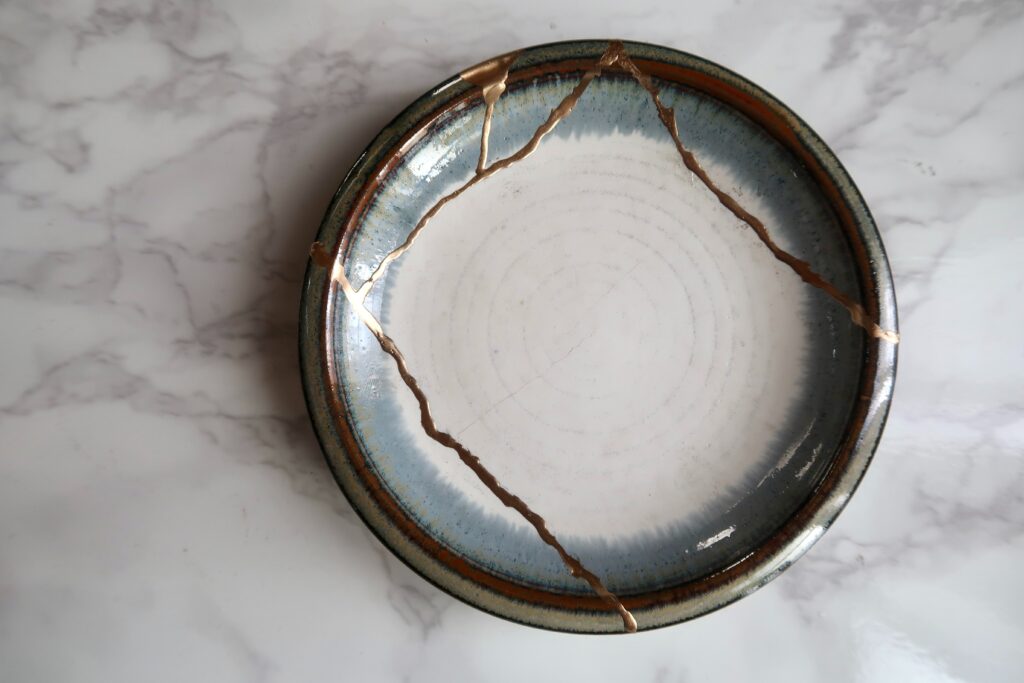
Wabi-Sabi is a Japanese aesthetic and philosophical principle, offering a unique perspective on the beauty we can find in imperfection and transience. Rooted in traditional Japanese culture (and the tea ceremony), it celebrates the simple, modest, and unpretentious aspects of life.
Appreciating Imperfection:
Wabi-Sabi encourages individuals to embrace imperfection in all its forms. It values the beauty that emerges from asymmetry, irregularity, and the patina of age. In contrast to Western ideals of perfection and flawlessness, it reminds us that perfection is unattainable and that there is inherent beauty in the imperfect. By appreciating imperfections, we cultivate a sense of authenticity and find charm in the unique qualities of objects, people, and experiences.

The perfect expression of this concept is the art of Kintsugi; that of repairing broken ceramics with gold powder and lacquer to highlight the repairs rather than attempting to hide them.
Photo by Riho Kitagawa on Unsplash
Finding Beauty in Simplicity:
Wabi-Sabi celebrates simplicity and unassuming beauty. It encourages the appreciation of the unadorned and the modest; favouring minimalism over extravagance. In an ‘airbrushed’ world often characterized by excess, it invites us to find contentment in the simplicity of life; stripping away unnecessary layers to connect with the essence of things and discover the profound beauty that lies in the uncomplicated.
Acknowledging Transience:
Central to Wabi-Sabi is the recognition and acceptance of the fleeting nature of experience. It reminds us that nothing lasts forever and that all things are subject to change and decay. By embracing this impermanence, we learn to appreciate the fleeting moments and savour the beauty of the present. Wabi-Sabi encourages us to find joy in the passage of time, as it brings new experiences, growth, and a deeper understanding of the world.
Nurturing a Connection with Nature:
Wabi-Sabi emphasizes the importance of fostering a deep connection with nature. It encourages the observation of, and drawing inspiration from the natural world. By immersing ourselves in nature, we can witness the beauty of its imperfection, and find solace in the harmony and balance that it offers; its cycles of growth, decay, and renewal embodying the essence of this principle .
Cultivating Mindfulness and Gratitude:
Wabi-Sabi promotes the practice of mindfulness and gratitude. We are invited as individuals to be fully present; to slow down and pay attention to the small, often overlooked details of life. By cultivating mindfulness, we can heighten our awareness of the beauty in our surroundings; finding gratitude for the simple pleasures that enrich our daily lives. By shifting our focus from what is lacking to what is present, we foster a greater sense of contentment and fulfilment.
In Summary:
Wabi-Sabi, the Japanese principle of embracing imperfection and finding beauty in transience, offers a profound perspective on the inherent beauty of life. By valuing imperfection, simplicity, and transience, we can cultivate a mindset of authenticity, contentment, and mindfulness. It reminds us as individuals to find beauty in the imperfect, to embrace the transitory nature of existence, and to connect with the simplicity and harmony of the natural world. By integrating these ideas into our lives, we can embark on a truly transformative journey towards a deeper appreciation of the subtle and often overlooked aspects of life; ultimately finding beauty, peace, and a sense of deep fulfilment.
To gain a deeper understanding, you could start with this fascinating article in the Positive Psychology blog. It goes into both Wabi-Sabi and Kintsugi in more detail. The more ambitious could take on Beth Kempton’s beautiful ‘Wabi Sabi: Japanese Wisdom for a Perfectly Imperfect Life’ (pictured above); I highly recommend it if you have the time (make the time if you don’t, and bring tissues).
For a slightly different take, try this video by Strutt Guitars on YouTube. Combining inspiration from Kintsugi with the incredible artistry and craft of luthiery, it’s stunning.
If you have enjoyed reading this post, you may be interested in my other related articles collected here, or my full set of wellbeing and personal development posts here.
A Wabi Sabi To-Do List
In Seeking Wabi-Sabi…
Embrace Imperfection:
- Appreciate the beauty in imperfections, asymmetry, and irregularities.
- Embrace the natural cycle of growth, decay, and transformation.
Simplify and Declutter:
- Remove unnecessary clutter and focus on essential elements.
- Create a sense of calm and spaciousness by simplifying your surroundings.
Connect with Nature:
- Bring elements of nature into your environment.
- Incorporate natural materials, textures, and organic forms in your living spaces.
Value the Patina of Age:
- Appreciate the character that develops over time (objects and people).
- Cherish objects that show signs of wear, weathering, and history.
Cultivate Mindfulness:
- Practice being present and fully engaged in the moment.
- Develop an awareness of the beauty in the ordinary and mundane.
Foster Intuition and Intention:
- Trust your intuition in making choices.
- Infuse your actions and creations with a sense of purpose and mindfulness.
Find Beauty in Transience:
- Accept the impermanence of things and appreciate the fleeting moments.
- Value the beauty that arises from change and the passage of time.
Remember that this is a personal journey. It will take time to embrace the imperfection, simplicity, and beauty of the present moment. Keep reminding yourself of the beauty and joy in the small everyday things; after a while you won’t have to.
